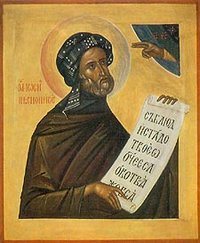Joseph the Hymnographer
Our father among the saints Joseph the Hymnographer was a monk during the 9th century who was a strong defender of the reverence of icons during the iconoclastic period. He is remembered for being a prolific writer of hymns, as noted throughout the Parakletike.
Life
The future Saint Joseph the Hymnographer was born in Sicily in 816, the son of Plotinus and Agatha, who were Christians. In 830, he and his family moved to Greece to escape the Arab invasions of Sicily. After being brought up by pious parents, he became a monk at the monastery of Latmos in his youth. Due to his piety and love towards God as a monk, he was praised by Saint Gregory the Dekapolite, who brought Joseph to Constantinople. Together with Saint Gregory, Saint Joseph staunchly defended the reverence of icons and preached his stance to others.
This was during the time of iconoclastic heresy in the Orthodox Church in Constantinople where both the patriarch and the emperor, Leo the Armenian, were iconoclasts. Saint Joseph was chosen by the Orthodox monks of Constantinople as a messenger to Pope Leo III, who was still in unity with the Eastern Church, to obtain his assistance. During this trip, Joseph was captured by Arab bandits, who delivered him to the iconoclasts for imprisonment. While in prison he inspired others to stand strong against the heretics. It was also during his imprisonment that Saint Nicholas of Myra appeared to him in a vision and asked him to sing in the name of God. After six years of captivity Saint Joseph was freed from prison.
After being freed he returned to Constantinople where he founded a monastery dedicated to Saint Gregory Dekapolite, who was no longer living by this time. He also dedicated a church in the name of Apostle Bartholomew, whom he honored greatly. While in strict fasting before the Feast of the Apostle Bartholomew, the apostle appeared to him in a dream and encouraged him to write hymns for the church. After writing his first hymn in honor of Apostle Bartholomew, Saint Joseph dedicated other hymns to Saint Nicholas, who freed him from prison, the Theotokos, and other saints. He is credited with composing about 1,000 hymns.
When the heresy of iconoclasm returned, he again stood steadfast against the movement and was sent to exile in Cherson for eleven years. Upon his return in 842, during the reign of Empress Theodora, he was appointed keeper of the Sacred Vessels at the Cathedral of the Holy Wisdom. But, again he was exiled after denouncing Bardas, brother of the the empress, for illicit cohabitation. Joseph returned again to Constantinople in 867 after Bardas' death.
When he was at a very old age and ill, the saint was told by the Lord that his life would soon be coming to an end. In response, Saint Joseph prayed intensively until his death, praying for peace for the Church and for mercy on his soul. He fell asleep in the Lord around 883. His legacy carries on as many canons in the Menaion and hymns in the Parakletike were composed by Saint Joseph the Hymnographer.
Categories > Church History
Categories > Church History
Categories > Church History
Categories > Liturgics
Categories > Liturgics > Feasts
Categories > Liturgics > Feasts
Categories > Liturgics > Feasts
Categories > Liturgics > Hymnography
Categories > People > Hymnographers
Categories > People > Saints
Categories > People > Saints > Byzantine Saints
Categories > People > Saints > Saints by century > 9th-century saints
